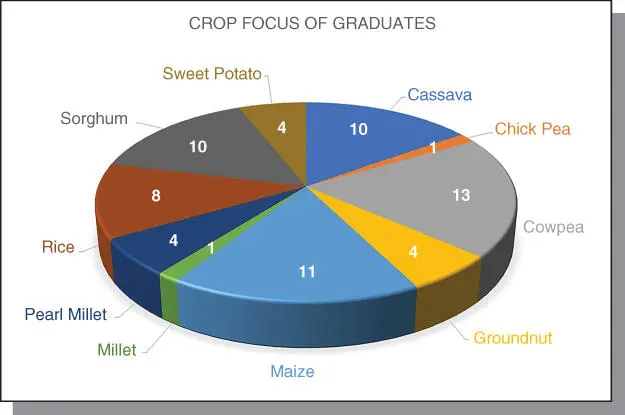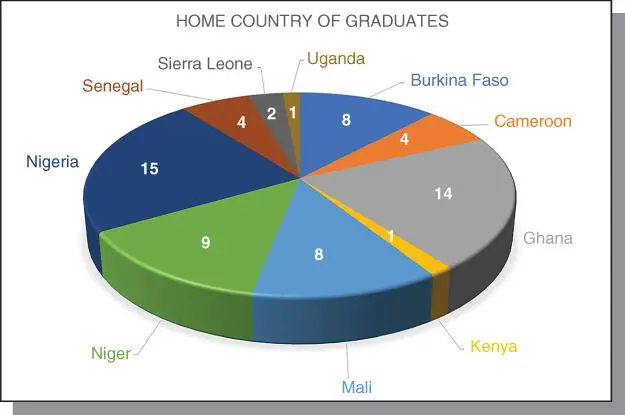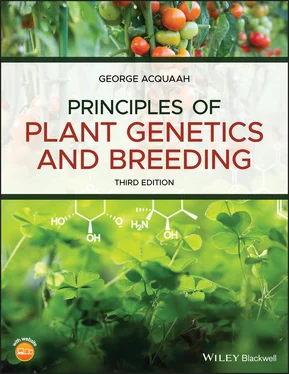WACCI graduates' research and breeding programs
The outcome of the work of WACCI graduates show how science education and training can be employed to improve livelihoods of communities in Africa through increased productivity in farmers' fields following adoption of improved varieties. Graduates continue to work on developing research outputs such as publications and release improved varieties after their graduation. The focal crops of PhD graduates of the WACCI Program since the first batch of students graduated in 2007 up until 2018 is presented in Figure B1.3. The most significant product of the WACCI program has been the 66 graduates trained in PhD Plant Breeding since inception for 10 countries in Africa so far. The graduates trained per country at WACCI (2013–2018) is presented in Figure B1.4.

Figure B1.3The focal crops of PhD graduates of the WACCI Programme (2013–2018).

Figure B1.4PhD Plant Breeding graduates trained per country at WACCI (2013–2018).
Breeding programs at WACCI
Beyond WACCI's primary mission of producing an equipped and analytical mass of plant breeders and seed scientists crucial to Africa's agricultural transformation, WACCI, in collaboration with industry, educational partners, and donor agencies undertakes projects targeted at breeding resilient and high‐yielding varieties of some staple crops across Africa. WACCI's breeding programs thus create an enabling platform for plant breeders to develop varieties and for students to have hands‐on experience in variety development. Smallholder farmers in the regions WACCI serve are major producers of these widely grown staples and efforts at breeding high‐yielding varieties for approval and release by governments across the regions climax engagements with not only farmers at the individual and communal level but also with ordinary Africans and their governments across varying scales vis à vis established extension services. The breeding initiatives thus move beyond training crop improvement experts to engaging communities. The major breeding programs at WACCI include: Maize Breeding Program, Tomato Hybrid Trials, Soybean, Cowpea, and Groundnut Improvement, and Sorghum Research Programs. Highlights of the maize breeding program are presented below.
WACCI maize breeding program
WACCI runs a Maize Breeding Program (MBP) at a University farm on the main campus of the University with testing sites across key agro‐ecological zones of Ghana. Maize is the most important grain crop in West Africa in terms of quantity produced and consumed by its 367 million people. Failure of maize in farmers' fields due to abiotic and biotic stresses in any season can lead to hunger and starvation in West Africa. A major drought in 1982 in Ghana led to famine in the country. Resilient varieties are, therefore, key to food security. The WACCI MBP maintains about 250 inbred lines and currently uses about 20 of these lines for developing hybrids. Ten hybrid lines were developed by foundation maize breeder, Dr. Charles The, a Cameroonian of blessed memory. With initial support from AGRA between 2009 and 2012 and funding from AGRA Scaling Seeds and Technology Partnership (SSTP) in Africa from 2015 to 2017, the Centre evaluated the 10 hybrids in multi‐locational trials in farmers' fields in three major agro‐ecological zones in Ghana, namely Legon, Wenchi, and Tamale. The multilocational trials were led by Professor Pangirayi Tongoona and Dr. Beatrice Ifie, Associate Director of Breeding Programs and maize breeder respectively at WACCI. Three high‐yielding white maize hybrids (WACCI‐M‐1210, WACCI‐M‐1205, and WACCI‐M‐1218) were selected and placed before the National Varietal Release and Registration Committee (NVRRC) in Ghana for approval and release. Prior to this release, no release of a hybrid maize variety by a Higher Education Institution has occurred in Ghana. WACCI‐M‐1210 hybrid yields 8–9 t ha −1in the Coastal Savannah, 10 t ha −1in the Forest and Transitional zones, and 5 t ha −1in the Guinea Savannah zone. It matures in 90–95 Days After Planting (DAP). WACCI‐M‐1205 has a yield potential of 10 t ha −1in the Coastal Savannah, 8–9 t ha −1in the Forest and Transitional zones, and 5 t ha −1in the Guinea Savannah. Its maturity range is similar to WACCI‐M‐1210. Characteristic of WACCI‐M‐1218 is its early maturity, producing flowers in 45–50 DAP and maturing in 80–85 DAP. Its yield is about 6–7 t ha −1in the Coastal Savannah and Transitional zones, and 5 t ha −1in the Guinea Savannah zone. WACCI‐M‐1218 is a climate smart variety which can withstand drought stress. These hybrids as acknowledged by the NVRRC constitute a major feat in addressing Ghana's challenge of providing farmers with improved seed varieties. Essentially, they typify WACCI's engagement of its focus countries and communities beyond training seed scientists and plant breeders by providing farmers in the sub‐region with high‐yielding varieties. The “Planting for Food and Jobs” (PFJ) program in Ghana has engaged WACCI to produce 20 tons of commercial maize hybrid seed for planting in the 2020 major season. Efforts at increasing the seed stock produced from these high‐yielding varieties are currently ongoing through engagements with Legacy Crop Improvement Centre (LCIC) Ltd., a private foundation seed company and other commercial seed producers.
Visibility and impact of WACCI
A number of distinguished visitors have commended the WACCI program. Sir Gordon Conway, world‐renowned advocate for food security had this to say when he visited WACCI on November 24, 2011: “The training of Anglophones and Francophones under one umbrella in the area of plant breeding is an excellent concept and AGRA should be commended for sponsoring the program.” A former Chief Scientist of USAID, Dr. Julie Howard and then Director of the Bureau for Food Security, Dr. Robert Betram (now Chief Scientist) visiting WACCI on January 12, 2012, intimated that the regional approach at WACCI needed strengthening because it is what Africa must be doing. The Chicago Council on Global Affairs in 2009 endorsed WACCI in a major publication, “Renewing Leadership in the Fight Against Global Hunger and Poverty,” as a model which must be replicated in Africa and South East Asia. Ms. Lisa Eakman, then Director of Global Agriculture, the Chicago Council on Global Affairs, visited WACCI on September 8, 2010, and commended the management and staff for the visibility WACCI had gained a few years after inception. An independent review panel led by Dr. Rita Mumm, Professor Emerita and Founding Director of the Illinois Plant Breeding Centre, University of Illinois, Urbana‐Champaign, in 2015 assessed that following proposed recommendations, WACCI was well positioned to join the ranks of the top‐tier institutes educating plant breeding professionals globally. The panel added that “Given WACCI's evolution, strategic plans for further expansion, and record of success to date, we view WACCI as an institution poised to have a tremendous impact on food security for Africa in the decade ahead and beyond by providing Africans with vital education in Africa to meet regional and global needs.”
Graduates of the WACCI program are contributing immensely to the growth and development of agriculture in their respective countries. A survey conducted in 2019 to access the impact of the PhD training program revealed that the majority of the graduates were working with National Agricultural Research Institutions, whiles others had taken academic positions in public and private universities. Over 40 plant breeding projects have been initiated by these graduates who have attracted a number of research grants from national and international organizations such as Bill and Melinda Gates Foundation, MasterCard Foundation, AGRA, Govan Mbeki Research, ProjetMaïs UEMOA, PIGEPE/IFAD, and USAID/UC‐DAVIS.
Читать дальше














